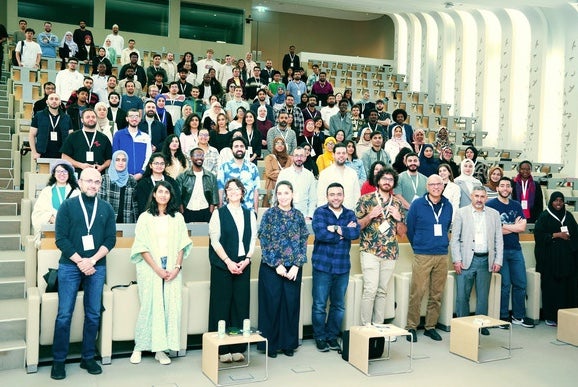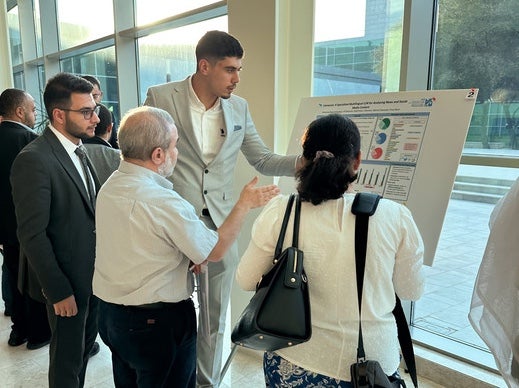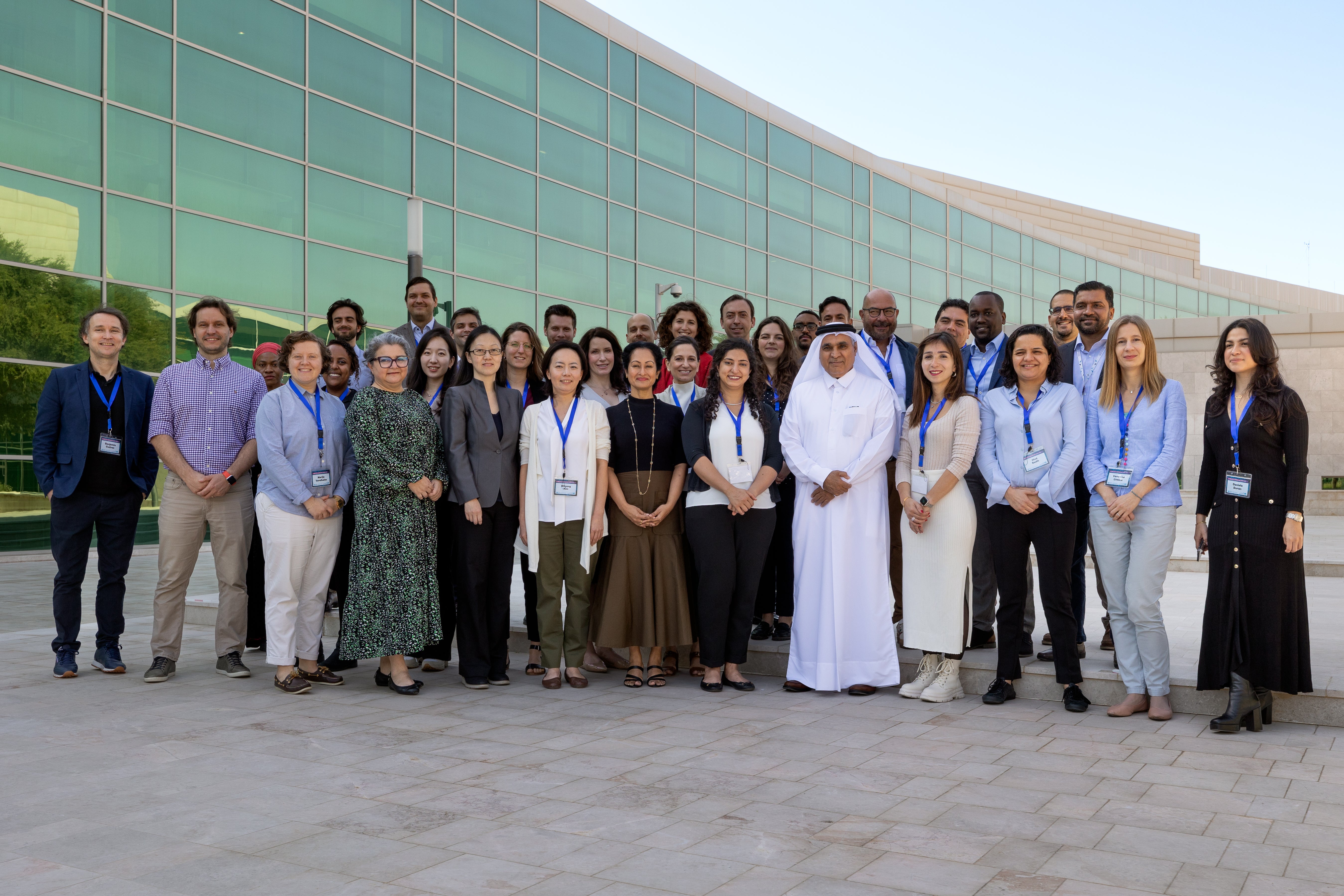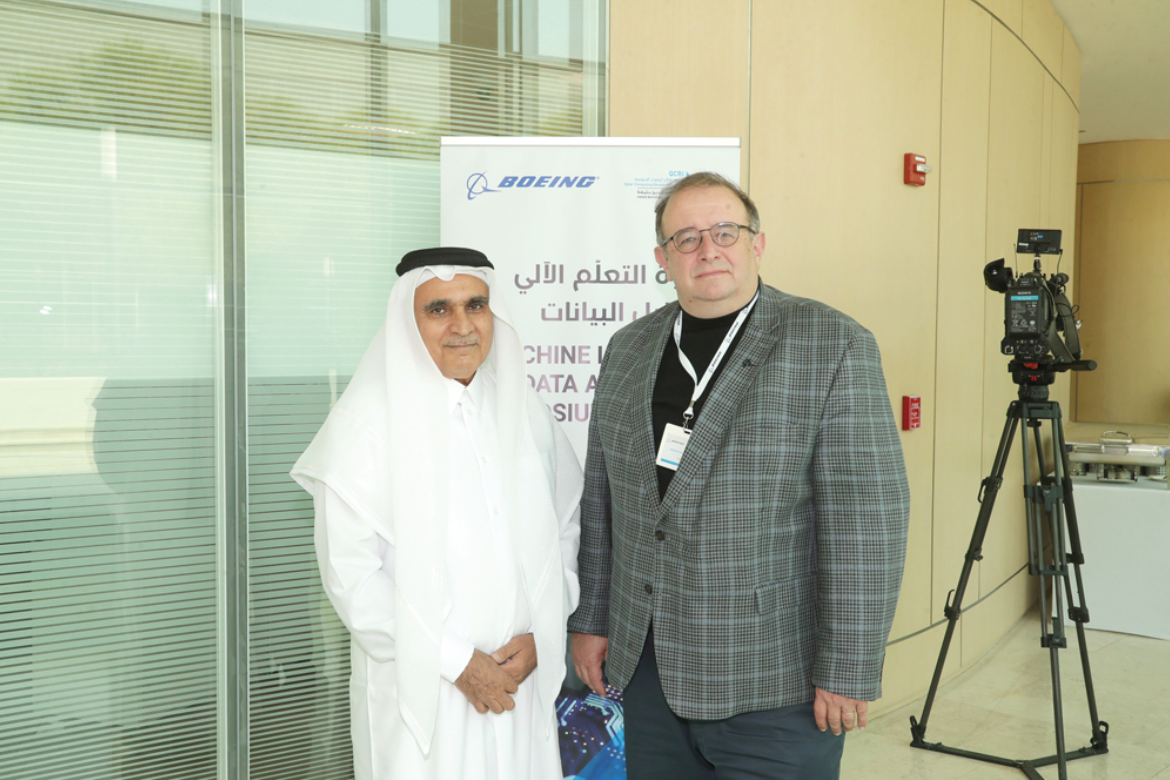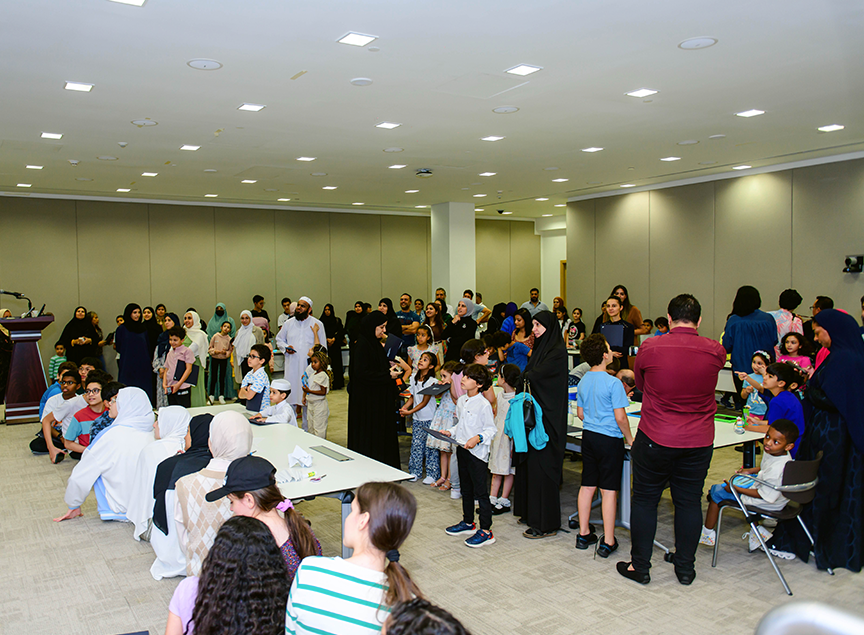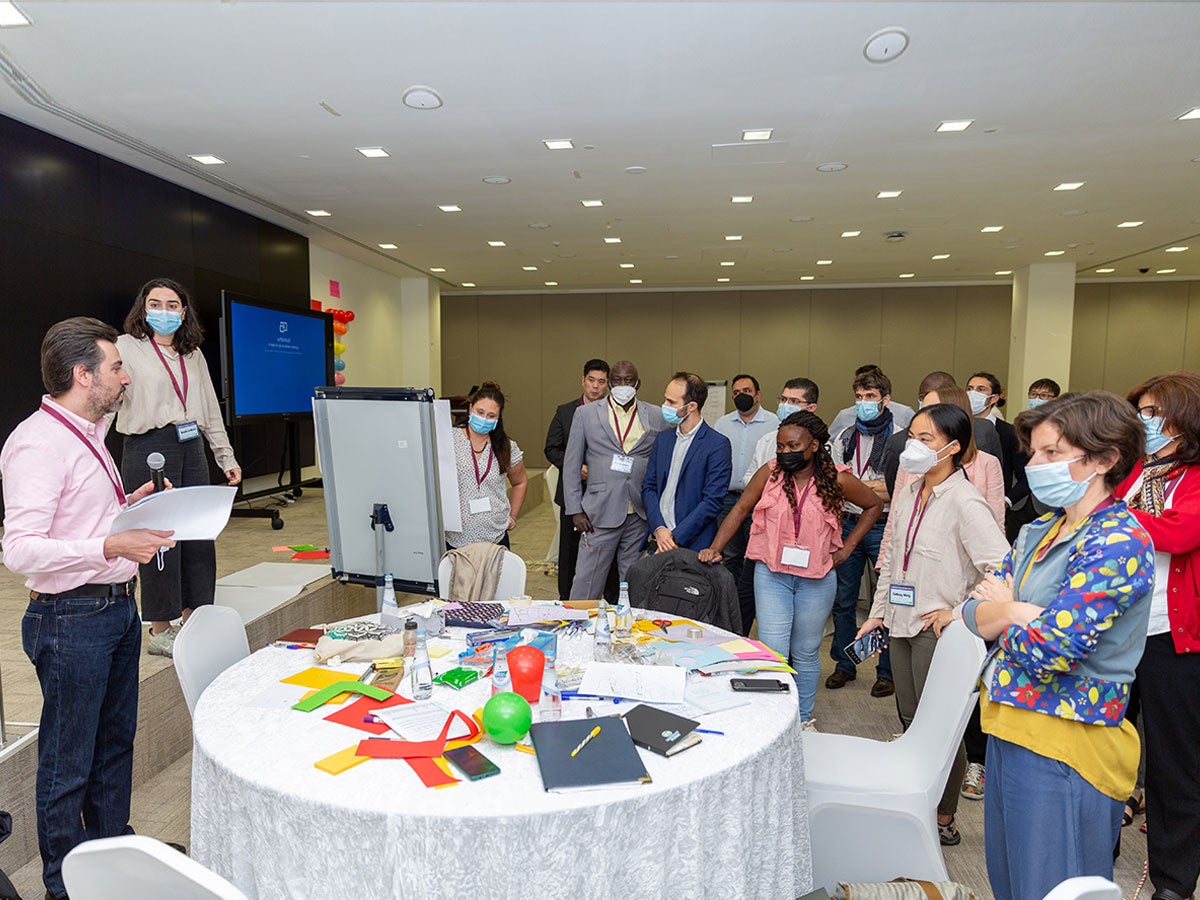
QCRI, HMC and the Mayo Clinic Shed Light on Genomics of Coronary Heart Disease
Study results may advance precision medicine pathways for coronary heart disease

Researchers at Qatar Computing Research Institute (QCRI), part of Hamad Bin Khalifa University (HBKU), Hamad Medical Corporation (HMC), and the Mayo Clinic in the United States, have shown that polygenic risk scores - the estimate of an individual’s genetic risk towards a disease - have a good predictive power for coronary heart disease in Qataris.
Their study, titled “Validation of Polygenic Risk Scores for Coronary Heart Disease in a Middle Eastern Cohort Using Whole Genome Sequencing”, was published in Circulation: Genomic and Precision Medicine on October 12.
The study is the first and largest disease-centric study in Qatar, the Middle East, and North Africa region that sheds light on the genetic architecture of coronary heart disease using whole genome sequencing. Study patients were recruited through the Qatar Cardiovascular Biorepository (QCbio) initiative, led by Prof. Jassim Al Suwaidi, Director of Cardiovascular Research at HMC. The sequencing of the patients was funded by Qatar Genome Program while the healthy controls were extracted from Qatar Biobank. The project also received support from Qatar National Research Fund.
Globally, coronary heart disease is one of the leading causes of death and its risk factors include lifestyle, environmental, and genetic factors. While many researchers study the genetic causes, the focus has been on patients of European origin. In genomic medicine, Arab and Middle Eastern populations are among the least studied, so there is little knowledge about the causes of many complex diseases. This factor highlights the importance of the study in advancing genomic studies for the region’s populations.
Dr. Mohamad Saad, Senior Research Scientist at the Qatar Center for Artificial Intelligence group at QCRI, explained that huge amounts of data had to be analyzed for this study: “We studied more than 100 million genetic markers across the DNA with the aim of identifying genes that differ between coronary heart disease patients and healthy Qatari individuals. We were successful in validating known genes, previously discovered in Europeans, and finding potentially novel genes that may be specific to Qataris and Arabs.”
Prof. Al Suwaidi said: “The study will have two areas of major clinical importance. First, it will aid in the primary risk stratification for coronary heart disease to identify high risk individuals based on their genetic risk. Second, it will facilitate more aggressive therapy and may set the stage for the emerging novel therapies that are being developed globally, such as one injection in a lifetime to treat hypercholesterolemia, currently being studied in the USA.”
Dr. Iftikhar Kullo, Professor of Medicine and Consultant, Department of Cardiovascular Medicine, Mayo Clinic, who together with Dr. Al Suwaidi, obtained funding from the Qatar National Research Fund to establish QCBio, said: “This is a vital study that demonstrates the potential of using polygenic risk scores in the Middle East to reduce the burden of coronary heart disease. The results highlight the importance of setting up hospital-linked biobanks in studying the genomic basis of diseases, particularly in understudied populations across the world.”
Reflecting on the results, Dr. Saad explained that polygenic risk scores, calculated for each individual using their genetic data, have been widely studied recently. A high score indicates increased risk of developing the disease. The scores, which can be calculated as early as birth, can help in predicting the occurrence of coronary heart disease or other diseases, and trigger preventive plans to delay or prevent disease onset.
“A very interesting outcome of this study is that we validated several polygenic risk scores in Qataris, unlike what was reported in previous studies for other diseases. There have been extensive efforts recently to implement polygenic scores in clinical practice, and our study will enable implementation for coronary heart disease in the future. We can imagine a scenario where a person comes to a hospital or visits a doctor, and not only performs the usual blood analysis but DNA sequencing as well, to predict the risk of developing cardiovascular diseases. Medical practitioners will be able to set a tailored prevention and treatment plan for people at high risk, combining medication, lifestyle, and diet,” said Dr. Saad.
In concluding, Dr. Ayman El Menyar, Consultant of Clinical Research at HMC, acknowledged the valuable role of the study participants: “We are grateful to the Qatari patients with coronary heart disease who participated in the QCBio study at the HMC Heart Hospital. Enrollment for the study took four years and was performed with the support of a research grant from Qatar National Research Fund and in collaboration with Prof. Iftikhar Kullo, and other experts at the Mayo Clinic, USA.”
For more information on the work at Qatar Computing Research Institute, and its vision to be a global leader of computing research enabling broader scientific discoveries, please visit qcri.hbku.edu.qa
Related News

HBKU’s Qatar Computing Research Institute Concludes Summer Internship Program Online
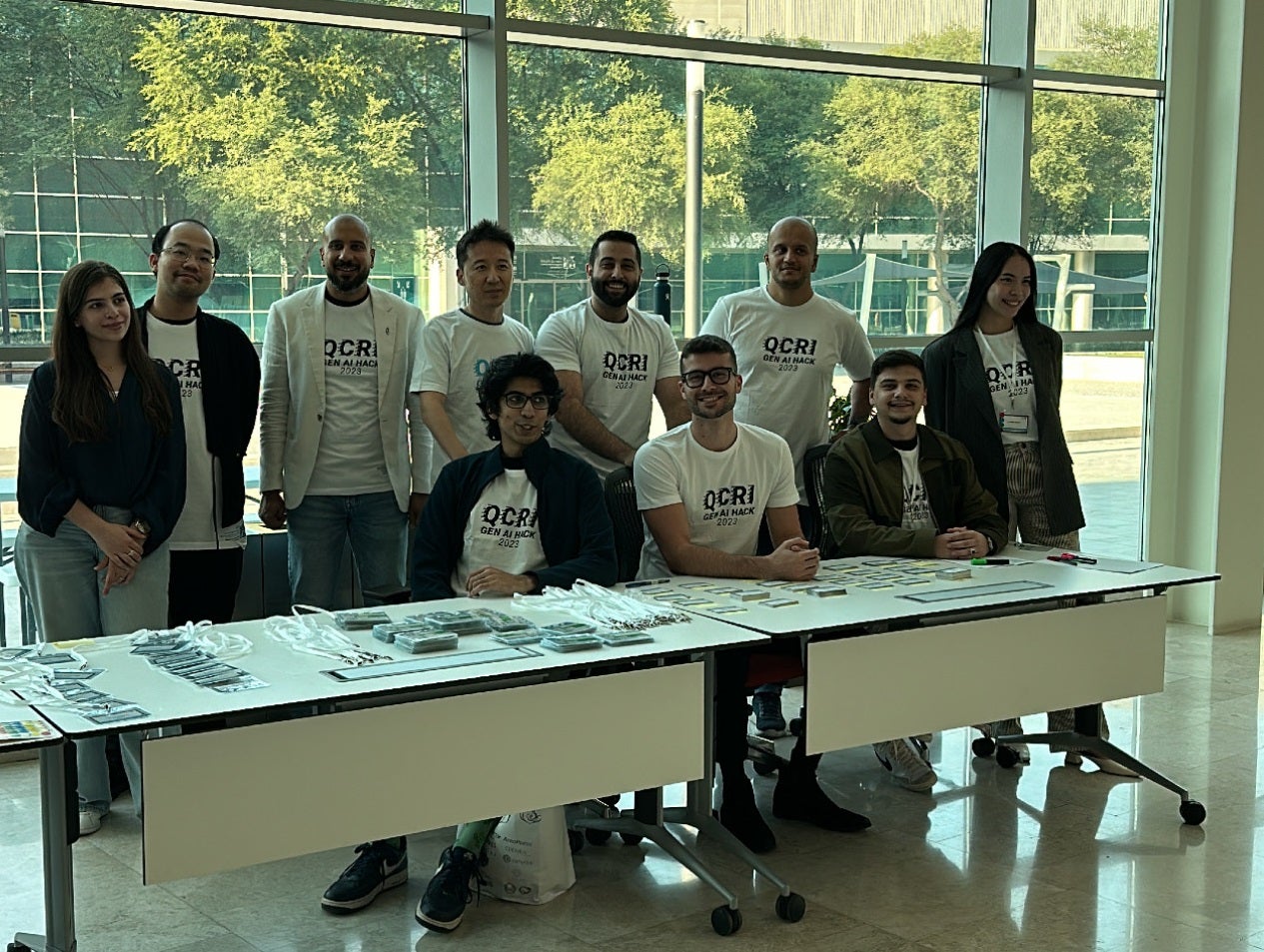
QCRI Generative AI Hackathon Delivers a Showcase of Innovation and Collaboration
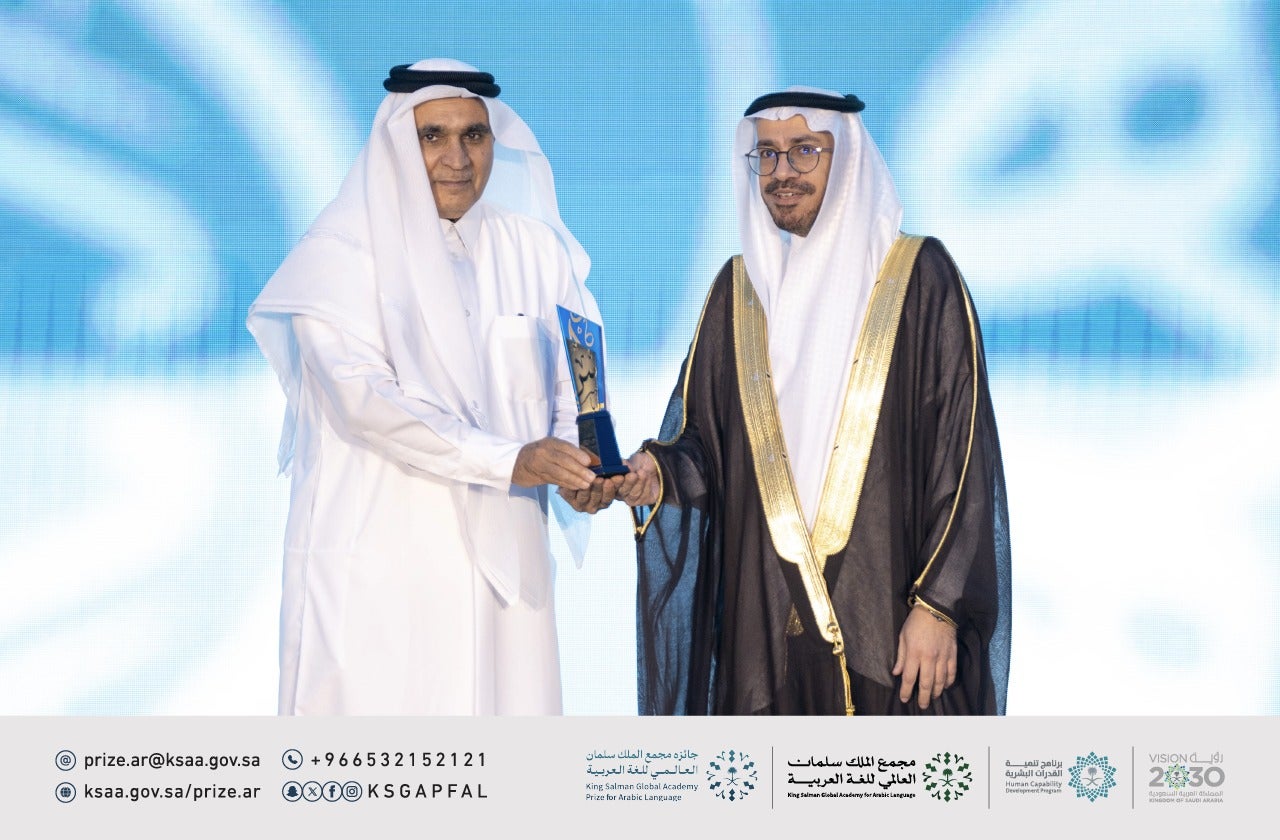
HBKU’s QCRI Receives King Salman International Academy Award for the Arabic Language 2023

HBKU’s Qatar Computing Research Institute Concludes Summer Internship Program Online

QCRI Generative AI Hackathon Delivers a Showcase of Innovation and Collaboration

HBKU’s QCRI Receives King Salman International Academy Award for the Arabic Language 2023

HBKU’s Qatar Computing Research Institute Concludes Summer Internship Program Online

QCRI Generative AI Hackathon Delivers a Showcase of Innovation and Collaboration

HBKU’s QCRI Receives King Salman International Academy Award for the Arabic Language 2023

HBKU’s Qatar Computing Research Institute Concludes Summer Internship Program Online

QCRI Generative AI Hackathon Delivers a Showcase of Innovation and Collaboration

HBKU’s QCRI Receives King Salman International Academy Award for the Arabic Language 2023

HBKU’s Qatar Computing Research Institute Concludes Summer Internship Program Online

QCRI Generative AI Hackathon Delivers a Showcase of Innovation and Collaboration

HBKU’s QCRI Receives King Salman International Academy Award for the Arabic Language 2023

HBKU’s Qatar Computing Research Institute Concludes Summer Internship Program Online

QCRI Generative AI Hackathon Delivers a Showcase of Innovation and Collaboration

HBKU’s QCRI Receives King Salman International Academy Award for the Arabic Language 2023

HBKU’s Qatar Computing Research Institute Concludes Summer Internship Program Online

QCRI Generative AI Hackathon Delivers a Showcase of Innovation and Collaboration

HBKU’s QCRI Receives King Salman International Academy Award for the Arabic Language 2023

HBKU’s Qatar Computing Research Institute Concludes Summer Internship Program Online

QCRI Generative AI Hackathon Delivers a Showcase of Innovation and Collaboration

HBKU’s QCRI Receives King Salman International Academy Award for the Arabic Language 2023

HBKU’s Qatar Computing Research Institute Concludes Summer Internship Program Online

QCRI Generative AI Hackathon Delivers a Showcase of Innovation and Collaboration

HBKU’s QCRI Receives King Salman International Academy Award for the Arabic Language 2023

HBKU’s Qatar Computing Research Institute Concludes Summer Internship Program Online

QCRI Generative AI Hackathon Delivers a Showcase of Innovation and Collaboration

HBKU’s QCRI Receives King Salman International Academy Award for the Arabic Language 2023

HBKU’s Qatar Computing Research Institute Concludes Summer Internship Program Online

QCRI Generative AI Hackathon Delivers a Showcase of Innovation and Collaboration

HBKU’s QCRI Receives King Salman International Academy Award for the Arabic Language 2023

HBKU’s Qatar Computing Research Institute Concludes Summer Internship Program Online

QCRI Generative AI Hackathon Delivers a Showcase of Innovation and Collaboration

HBKU’s QCRI Receives King Salman International Academy Award for the Arabic Language 2023

HBKU’s Qatar Computing Research Institute Concludes Summer Internship Program Online

QCRI Generative AI Hackathon Delivers a Showcase of Innovation and Collaboration

HBKU’s QCRI Receives King Salman International Academy Award for the Arabic Language 2023

HBKU’s Qatar Computing Research Institute Concludes Summer Internship Program Online

QCRI Generative AI Hackathon Delivers a Showcase of Innovation and Collaboration

HBKU’s QCRI Receives King Salman International Academy Award for the Arabic Language 2023

HBKU’s Qatar Computing Research Institute Concludes Summer Internship Program Online

QCRI Generative AI Hackathon Delivers a Showcase of Innovation and Collaboration

HBKU’s QCRI Receives King Salman International Academy Award for the Arabic Language 2023

HBKU’s Qatar Computing Research Institute Concludes Summer Internship Program Online

QCRI Generative AI Hackathon Delivers a Showcase of Innovation and Collaboration

HBKU’s QCRI Receives King Salman International Academy Award for the Arabic Language 2023

HBKU’s Qatar Computing Research Institute Concludes Summer Internship Program Online

QCRI Generative AI Hackathon Delivers a Showcase of Innovation and Collaboration

HBKU’s QCRI Receives King Salman International Academy Award for the Arabic Language 2023

HBKU’s Qatar Computing Research Institute Concludes Summer Internship Program Online

QCRI Generative AI Hackathon Delivers a Showcase of Innovation and Collaboration

HBKU’s QCRI Receives King Salman International Academy Award for the Arabic Language 2023

HBKU’s Qatar Computing Research Institute Concludes Summer Internship Program Online

QCRI Generative AI Hackathon Delivers a Showcase of Innovation and Collaboration

HBKU’s QCRI Receives King Salman International Academy Award for the Arabic Language 2023

HBKU’s Qatar Computing Research Institute Concludes Summer Internship Program Online

QCRI Generative AI Hackathon Delivers a Showcase of Innovation and Collaboration

HBKU’s QCRI Receives King Salman International Academy Award for the Arabic Language 2023

HBKU’s Qatar Computing Research Institute Concludes Summer Internship Program Online

QCRI Generative AI Hackathon Delivers a Showcase of Innovation and Collaboration

HBKU’s QCRI Receives King Salman International Academy Award for the Arabic Language 2023

HBKU’s Qatar Computing Research Institute Concludes Summer Internship Program Online

QCRI Generative AI Hackathon Delivers a Showcase of Innovation and Collaboration

HBKU’s QCRI Receives King Salman International Academy Award for the Arabic Language 2023

HBKU’s Qatar Computing Research Institute Concludes Summer Internship Program Online

QCRI Generative AI Hackathon Delivers a Showcase of Innovation and Collaboration

HBKU’s QCRI Receives King Salman International Academy Award for the Arabic Language 2023

HBKU’s Qatar Computing Research Institute Concludes Summer Internship Program Online

QCRI Generative AI Hackathon Delivers a Showcase of Innovation and Collaboration

HBKU’s QCRI Receives King Salman International Academy Award for the Arabic Language 2023

HBKU’s Qatar Computing Research Institute Concludes Summer Internship Program Online

QCRI Generative AI Hackathon Delivers a Showcase of Innovation and Collaboration

HBKU’s QCRI Receives King Salman International Academy Award for the Arabic Language 2023

HBKU’s Qatar Computing Research Institute Concludes Summer Internship Program Online

QCRI Generative AI Hackathon Delivers a Showcase of Innovation and Collaboration

HBKU’s QCRI Receives King Salman International Academy Award for the Arabic Language 2023

HBKU’s Qatar Computing Research Institute Concludes Summer Internship Program Online

QCRI Generative AI Hackathon Delivers a Showcase of Innovation and Collaboration

HBKU’s QCRI Receives King Salman International Academy Award for the Arabic Language 2023

HBKU’s Qatar Computing Research Institute Concludes Summer Internship Program Online

QCRI Generative AI Hackathon Delivers a Showcase of Innovation and Collaboration

HBKU’s QCRI Receives King Salman International Academy Award for the Arabic Language 2023

HBKU’s Qatar Computing Research Institute Concludes Summer Internship Program Online

QCRI Generative AI Hackathon Delivers a Showcase of Innovation and Collaboration

HBKU’s QCRI Receives King Salman International Academy Award for the Arabic Language 2023

HBKU’s Qatar Computing Research Institute Concludes Summer Internship Program Online

QCRI Generative AI Hackathon Delivers a Showcase of Innovation and Collaboration

HBKU’s QCRI Receives King Salman International Academy Award for the Arabic Language 2023

HBKU’s Qatar Computing Research Institute Concludes Summer Internship Program Online

QCRI Generative AI Hackathon Delivers a Showcase of Innovation and Collaboration

HBKU’s QCRI Receives King Salman International Academy Award for the Arabic Language 2023

HBKU’s Qatar Computing Research Institute Concludes Summer Internship Program Online

QCRI Generative AI Hackathon Delivers a Showcase of Innovation and Collaboration

HBKU’s QCRI Receives King Salman International Academy Award for the Arabic Language 2023

HBKU’s Qatar Computing Research Institute Concludes Summer Internship Program Online

QCRI Generative AI Hackathon Delivers a Showcase of Innovation and Collaboration

HBKU’s QCRI Receives King Salman International Academy Award for the Arabic Language 2023

HBKU’s Qatar Computing Research Institute Concludes Summer Internship Program Online

QCRI Generative AI Hackathon Delivers a Showcase of Innovation and Collaboration

HBKU’s QCRI Receives King Salman International Academy Award for the Arabic Language 2023

HBKU’s Qatar Computing Research Institute Concludes Summer Internship Program Online

QCRI Generative AI Hackathon Delivers a Showcase of Innovation and Collaboration

HBKU’s QCRI Receives King Salman International Academy Award for the Arabic Language 2023

HBKU’s Qatar Computing Research Institute Concludes Summer Internship Program Online

QCRI Generative AI Hackathon Delivers a Showcase of Innovation and Collaboration

HBKU’s QCRI Receives King Salman International Academy Award for the Arabic Language 2023

HBKU’s Qatar Computing Research Institute Concludes Summer Internship Program Online

QCRI Generative AI Hackathon Delivers a Showcase of Innovation and Collaboration

HBKU’s QCRI Receives King Salman International Academy Award for the Arabic Language 2023

HBKU’s Qatar Computing Research Institute Concludes Summer Internship Program Online

QCRI Generative AI Hackathon Delivers a Showcase of Innovation and Collaboration

HBKU’s QCRI Receives King Salman International Academy Award for the Arabic Language 2023

HBKU’s Qatar Computing Research Institute Concludes Summer Internship Program Online

QCRI Generative AI Hackathon Delivers a Showcase of Innovation and Collaboration

HBKU’s QCRI Receives King Salman International Academy Award for the Arabic Language 2023

HBKU’s Qatar Computing Research Institute Concludes Summer Internship Program Online

QCRI Generative AI Hackathon Delivers a Showcase of Innovation and Collaboration

HBKU’s QCRI Receives King Salman International Academy Award for the Arabic Language 2023








